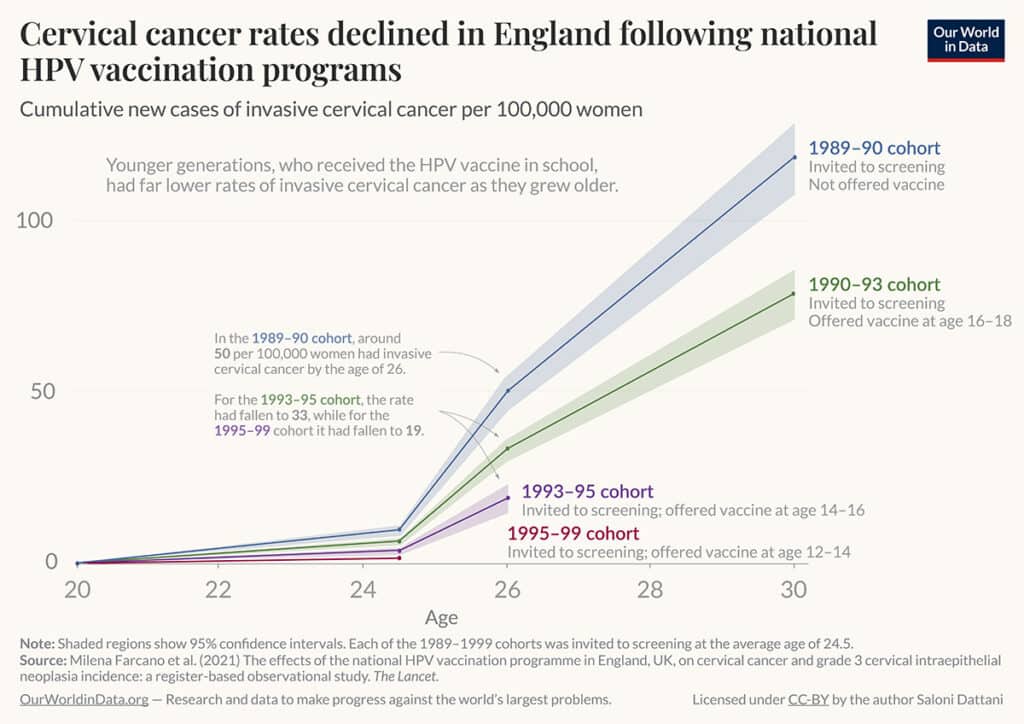Volcanoes are erupting in The Philippines, but on-fire Australia received some welcome rain. The Iran war cries have been called off and The Donald’s military powers are about to be hamstrung by the Senate. Meanwhile, his impeachment trial is starting, and we’re all on Twitter for a front-row seat.
What Could Go Right? Eliminating a Cancer Is Within Reach
This could be the first cancer humanity consigns to the dustbin of history.
This is our weekly newsletter, What Could Go Right? Sign up here to receive it in your inbox every Thursday at 5am ET. You can read past issues here.
Some logistics before we get to this edition: we’ll be sharing our roundup of United States-based progress for 2024 next week, on 12/12, and our global one the following week, on 12/19, before taking a two-week break for Christmas and New Year’s. We’ll return on 1/9.
Eliminating a Cancer Is Within Reach
Last month, the Director-General of the World Health Organization (WHO), Dr. Tedros Adhanom Ghebreyesus, published an editorial with a remarkable title: “For the first time, the elimination of a cancer is within our reach.”
This cancer is cervical cancer, which kills over 350,000 women every year, primarily in poor countries. To eliminate it would mean to bring its incidence down to fewer than four cases per 100,000 women, although active preventative measures would still be necessary.
One preventative measure in particular makes the case of cervical cancer different from other cancers, and its elimination possible. Nearly all cervical cancers are caused by a virus, human papillomavirus (HPV), which is spread through sexual contact.
A vaccine against HPV was first developed in the 1990s by researchers in Australia, and introduced in 2006. A second version that expanded the vaccine’s range against additional strains of HPV was introduced in 2014. It is one of only two preventative cancer vaccines to exist.
It is hard to overstate how effective the HPV vaccine is at preventing cervical cancer. If given to girls before they are sexually active, at around age 12, their risk of developing the cancer drops to nearly zero.
Where high vaccination coverage has been combined with routine screening—an HPV test usually done alongside an annual Pap smear—cervical cancer rates as well as associated deaths have already plummeted. For instance, a study published last month found that mortality rates from cervical cancer in American women under the age of 25 had dropped to only .007 deaths per 100,000 people by 2021.
In the chart below from Our World in Data, you can see how offering the vaccine at progressively younger ages, plus screening, has resulted in a similarly stunning outcome in England. As the study the chart is based on summarizes, “The HPV immunization program has successfully almost eliminated cervical cancer in women born [in England] since September 1, 1995.”

The WHO is after that kind of result worldwide, a challenge for countries where there is not dependable access to screening or to the vaccine. In 2020, however, most countries in the world adopted the WHO’s 90-70-90 goals: 90 percent of girls fully immunized against HPV; 70 percent of women receiving timely screening; and 90 percent of those found with precancer or cancer accessing treatment.
Of low- and middle-income countries, Bhutan was the first to reach the 90-70-90 targets in 2023. In high-income countries, there is a race for which will be the first to reach elimination. Australia is a major contender, currently on track for the early 2030s. England has pledged to do it by 2040.
In a few countries, women can even collect their own samples to test for HPV. Such self-collection devices, which can look like a big Q-tip or a tampon, were approved for use in the US in May.
Our World in Data also reports that new, cheaper HPV vaccines, which have been developed but are not yet available internationally, may give the global vaccination push a boost. For its part, Gavi, The Vaccine Alliance, which distributes vaccines to the world’s poorest countries, plans to vaccinate 120 million children between now and 2030.
The elimination of cervical cancer is not a milestone that will be reached tomorrow. The WHO thinks it can be done in the next century. But the fact that it is, as Ghebreyesus writes, now an “achievable” and not just an “aspirational” goal, is an extraordinary opportunity.
What Could Go Right? S6 E31

How many US states have increased their minimum wage in 2024? Have greenhouse gas emissions gone down in the EU this year? Has the ozone layer begun to heal itself? Zachary and Emma wrap up 2024 by reflecting on positive developments around the world in the past year, one that many consider a year to forget. They revisit conversations with memorable guests and discuss their favorite conversations from this season, ranging from climate change to immigration to the many impacts of social media. | Listen now
By the Numbers
2,451: The number of women, a record, although a marginal jump from last year, who will take seats in American state legislatures next year. That represents about a third of all available seats.
$2,380: Ethiopia’s average income, which has, along with the incomes of eight other countries in Africa, doubled since 1990.
961: The number of highly endangered animals, including different kinds of lemurs and tortoises, being sent home to Madagascar after an anti-trafficking operation recovered them in Thailand.
Quick Hits
🧬 The Human Cell Atlas is a project that is attempting to catalog every cell type in the human body, from development to old age—or an estimated 37.2 trillion cells. Researchers are making progress with this “Wikipedia for cells,” with the latest efforts encompassing data from 62 million of them.
✈️ Plane crashes make headlines, but safe landings do not. Our World in Data calculated how far US airlines have carried passengers since the last US-based crash in 2009: 13.3 trillion miles, the equivalent of 28 million trips to the moon and back.
🚘 Norway is close to becoming the world’s first all-electric vehicle market, with EVs accounting for 94 percent of new car sales there. What has encouraged Norwegians to buy electric? Simple economics, says Bloomberg. ($)
⚖️ The State of Mexico, one of Mexico’s 31 states, has decriminalized abortion during the first trimester of a pregnancy. It is the 19th state there to make this change, after a 2021 Supreme Court ruling that found the absolute criminalization of abortion to be unconstitutional.
📉 Before the Biden administration regulated do-it-yourself gun kits, which weren’t considered firearms and could be sold without licenses, background checks, serial numbers, and so on, there was a surge of so-called “ghost guns” being used in crimes. With the new regulations passed in 2021, however, some states and major cities are now seeing that surge abate.
🏳️🌈 Hong Kong’s top court has ruled to uphold inheritance and public housing benefits for same-sex couples after two couples married abroad tangled with laws there that prevented property transfer to, or cohabitation with, their spouse. Same-sex marriage isn’t recognized in Hong Kong, but the ruling is an expansion of gay rights in the region. (NYT $)
👀 What we’re watching: Could the brief declaration of martial law in South Korea this week be a rare opportunity to entrench democracy?
💡 Editor’s pick: Since in the past we have shared stories about the advances around xenotransplantation—when animal organs are transplanted into a human—we would also like to share this piece in which an ethicist shares her concerns about the practice, in service of our commitment to never “progress-wash” issues.
TPN Member Originals
(Who are our Members? Get to know them.)
- How to end the scourge of maternal mortality | Project Syndicate | Anne-Marie Slaughter
- The moral challenge of Trumpism | NYT ($) | David Brooks
- Technologies of resistance from Nazi Germany to Myanmar | Lucid | Ruth Ben-Ghiat
- Neoliberalism didn’t fail and isn’t dead, yet | The Edgy Optimist | Zachary Karabell
- Why drug overdose deaths are dropping for some, rising for others | NYT ($) | Maia Szalavitz
- Why age-gating social media is both necessary and doable | After Babel | Scott Galloway
- We need reality-based energy policy | Slow Boring | Matthew Yglesias


